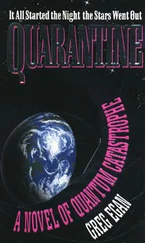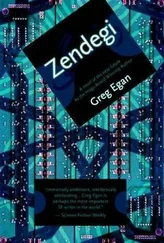But Azelio had no such consolations; he was only here in the hope of making the mountain safer for the children he’d promised to protect.
On their way to the next plot Agata asked him, ‘Is it the composition of the soil? Or is it the arrow?’
‘I can’t say for sure,’ Azelio replied.
‘Can’t you guess?’ Agata pressed him.
He said, ‘The spectra suggest that at least two of the soil types should have had everything the wheat needed.’
‘So it probably is the arrow?’ There was nothing inimical to life about the mere presence of a conflicting arrow; the crew had survived it perfectly well, thanks to their store of food with its unambiguous origins and their undiminished ability to rid their bodies of excess heat. Esilio even accepted their excrement without complaint, however bizarre the material’s fate would seem to a time-reversed observer. But the plants’ uptake of nutrients relied on interactions between their roots and the native soil at a microscopic level, and there was no guarantee that the two systems, left to themselves, would simply sort out their differences.
Azelio wasn’t ready to give up hope of a simple agronomic solution. ‘We could try mixing the most promising soils,’ he said. ‘Or we could look for better conditions elsewhere. If it’s the arrow, that’s the end of it.’
Agata said, ‘I’ll defer to your expertise on soil chemistry – but when it comes to the arrow, let me be the judge. The problem still might not be insurmountable.’
‘Really?’ Azelio buzzed sceptically. ‘You can’t even sweep your own floor any more. How are you going to reach into the ground and persuade every speck of dust that it’s mistaken about the route it’s taking away from the entropy minimum?’
Agata had no answer to that. But if she couldn’t change the brute facts, the cosmos wasn’t taking sides in this clash: it simply had no choice but to reconcile everything it had brought together. If there had to be an accommodation between Esilio’s arrow and the Surveyor ’s, the trick would be to find a way to make the crop’s failure even more improbable than its success.
Ramiro must have made a choice, Agata realised, not to seek constant updates on the state of the crops. Warned that there could be problems at the start as the plants adapted to their new conditions, he’d stepped back and left it to Azelio to monitor their health, and to offer a verdict only once it was warranted.
But Ramiro wasn’t blind, and as the flowers ceased unfurling and the stalks began to wither, Agata could see that both men were losing hope.
Bell after bell, day after day, she sketched elaborate diagrams for machines to manipulate the soil’s properties. Chemically, each mineral grain was no different from that of an equivalent on the Peerless or the home world. Physically, the distinction came down to the fact that soil on the home world had once been solid rock, while for Esilian soil, from her own point of view, that fate still lay in the future. Or in Esilio’s terms, the vast bulk of the planet’s soil had been eroded from rock… leaving two competing possibilities: that some small portion of it had actually been emitted from the roots of time-reversed stalks of wheat, or that those strange withered plants had failed to contribute anything before finally regaining their health and being carried away by the visitors.
Still, a plant knew nothing of the past and future of each grain of sand; the whole interaction with the roots had to make sense in the present. If she could find a way to measure the detailed distribution of thermal vibrations in the soil they’d brought with them, and then recreate that in the native soil, it would no longer be statistically reasonable for the plants to fail to absorb it.
To the naked eye, soil was just soil – and if the differences were microscopic, how hard could they be to erase? But when she took the most promising of her schemes and thought seriously about the practicalities, the measurements were close to impossible, the manipulations impractical, the computations prohibitive and the projected throughput so slow that a cubic scant of soil would have taken eons to process.
Agata deleted the sketches from her console. She peeled off her corset and lay down on her sand bed. The whole approach was a dead end: she might as well have set out to reverse the motion of every particle of air in the Surveyor in the hope of creating a breeze that would carry all the dust away.
Anything that sought to inscribe a new arrow into the soil at a microscopic level was doomed; the numbers would always be against her. What she needed was something infinitely less subtle.
Agata waited until she had a chance to speak to Tarquinia alone. ‘Do you remember telling me once that you believed Greta had put a bomb on the Surveyor ?’
Tarquinia replied warily, ‘No, but I’ll take your word for it.’
‘My word that there’s a bomb?’
‘No, your word that I told you.’
‘So it’s true?’
Tarquinia struggled to reconstruct some half-forgotten chain of inferences. ‘Verano dropped some hints. He was very apologetic.’
‘Is there any way to be sure?’ Agata pleaded. ‘Greta might have put him up to the apology, as a kind of misinformation.’ Even before the launch, the whole crazed-anti-messager-rams-the- Peerless scenario had never struck her as very plausible, and after spending six years with Ramiro – irritating as he could be – Agata had to strive mightily to put herself inside the head of anyone who’d imagined him commandeering the Surveyor and turning it into a weapon.
Tarquinia was bemused. ‘This is a strange time to start worrying about it,’ she said. ‘If an unexpected bump could set it off, we’d have been dead long ago.’
‘If the Council really didn’t trust Ramiro not to turn saboteur,’ Agata reasoned, ‘then they wouldn’t have been content with a bluff, would they? They would have insisted on some genuine means to destroy the Surveyor if it turned rogue.’
‘I suppose that’s true,’ Tarquinia agreed. ‘Though over the last six years I’ve become pleasantly accustomed to not having to think about politicians at all, so I don’t know what my judgement is worth now.’
‘If there’s a bomb, we need to find it,’ Agata declared. ‘We need to cut it open and extract the explosive.’
Tarquinia swivelled on her couch, assessing this suggestion. ‘We need to locate the hidden, possibly tamper-proof bomb that’s been obliging enough not to kill us so far, and start prodding and poking at it now… because?’
‘Because the test plots are failing,’ Agata explained. ‘So we need to take the explosive up into the hills, turn some rock into soil for ourselves – against the Esilian arrow – and see if that imbues the soil with the properties that it needs to support plant growth.’
‘If wheat hadn’t failed to grow properly in weightlessness,’ Tarquinia mused, ‘then Yalda never would have ordered the spin-up. And if Yalda hadn’t ordered the spin-up, the Peerless might well have been incinerated by antimatter. So really, I ought to be encouraged by history: anything that starts with crop failure ends well.’ There was a sound of hardstone scraping against hardstone, then slipping.
‘Can you see what you’re doing?’ Agata aimed her own coherer down into the maintenance shaft.
‘Yes, I can see,’ Tarquinia replied. ‘It’s just that none of these bolts have been turned since the engines were assembled.’
‘The bomb’s not going to explode just because you open that panel, is it?’ Agata asked anxiously.
Tarquinia looked up at her, affronted. ‘However much pressure he was under, Verano would never have done anything so perverse. We’re entitled to inspect our own engines; that hardly amounts to an act of sedition.’
Читать дальше










